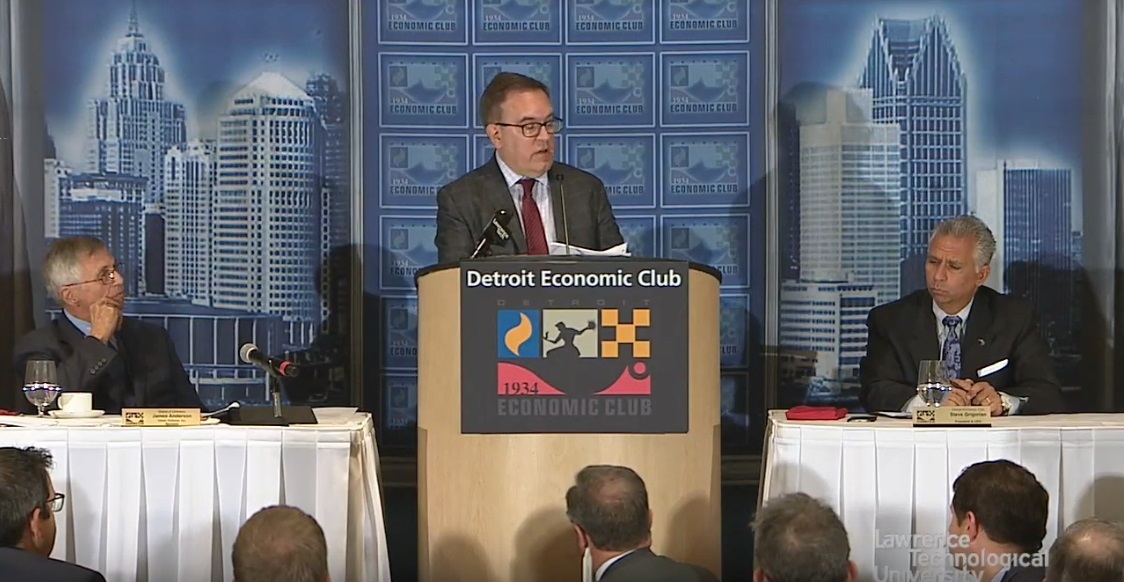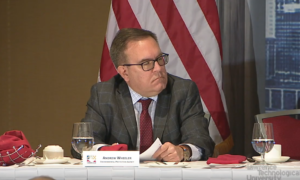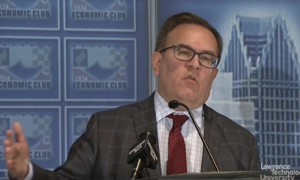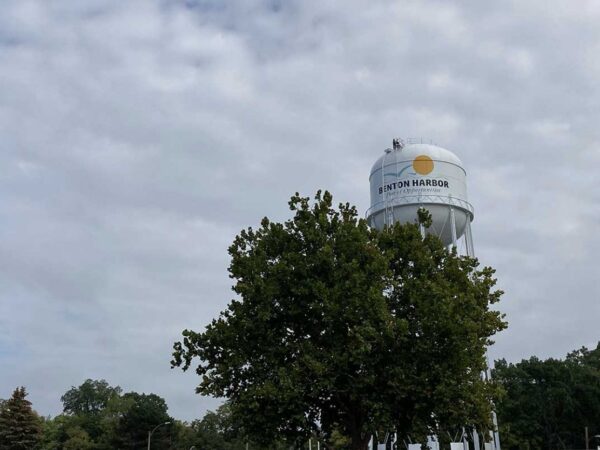
The Environmental Protection Agency announced $10.6 million in grants awarded to various Great Lakes restoration projects at a press conference on Detroit’s Belle Isle state park on Tuesday.
EPA Administrator Andrew Wheeler described the agency’s priorities for the Great Lakes Restoration Initiative’s Action Plan III, which focuses on fiscal years 2020 through 2024.

EPA Administrator Andrew Wheeler at the Detroit Economic Club Meeting
The five target areas Wheeler listed were: the cleanup of toxic chemicals; keeping Asian carp and other invasive species out of the lakes; reducing the causes and extent of harmful algal blooms; protecting and restoring habitat for fish, birds and wildlife; and continuing Great Lakes education and outreach efforts.
Wheeler, appointed by President Trump, also listed specific goals for the administration, which include reducing the number of beneficial use impairments in the region from 255 to 128 by the end of the five-year period, doubling the amount of stormwater runoff reduced through green infrastructure practices and restoring, protecting or enhancing more than 70,000 acres of coastal wetlands and other habitats.
This year, for the third year in a row, President Trump proposed eliminating or severely cutting Great Lakes Restoration Initiative funding. In March, he proposed reducing the GLRI to $30 million from its usual $300 million.
On the heels of that, Wheeler brought up the Trash-Free Great Lakes Grant Program he first announced in July. The program, which will start accepting applications next month, has $2 million available for grants for Great Lakes cleanup projects.
EPA Region 5 Chief of Staff Kurt Thiede then listed the five grants EPA is awarding. The grants, totaling $10.6 million, are:
- $3.7 million for the Michigan Department of Natural Resources to restore the natural surface water flow in the flat woods of Belle Isle.
- $3.5 million of a three-year grant totaling $10.5 million for the Michigan Department of Environment, Great Lakes and Energy for Areas of Concern and lakewide management plan assistance.
- $380,000 for Wayne County to design habitat restoration projects in the Rouge River Area of Concern.
- $815,500 to the Alliance of Rouge Communities to restore wetlands in Seeley Creek in Oakland County.
- $2.2 million to the Allianceof Rouge Communities to restore Tamarack Creek in Southfield and Johnson Creek around Northville.
The Trump administration repealed the 2015 Waters of the United States rule in September, a move environmentalists say will leave wetlands more vulnerable. President Trump has ordered a replacement policy that will be out this winter, according to Wheeler.

EPA Administrator Andrew Wheeler speaking before the Detroit Economic Club
“Our goal is to have a clear, easily understood definition so property owners can stand on their property and be able to tell for themselves whether or not they have federal waterways on their property,” Wheeler said.
On nutrient runoff and management practices for farmers, Wheeler said the EPA would be introducing a new policy to “encourage market-driven solutions for excess nutrients.”
“We think working cooperatively with the farmers instead of using the hammer might get more results and lead to better results here for the Great Lakes,” Wheeler said.
Sen. Gary Peters announced on Tuesday as well that he would be filing an amendment to a funding bill to increase funding for the Great Lakes Restoration Initiative. The amendment would increase GLRI funding from $301 million to $320 million for Fiscal Year 2020. The House of Representatives already passed a similar bill that included the GLRI funding increase.
Peters, a Democrat, introduced bipartisan legislation alongside Democratic Sen. Debbie Stabenow and Republican Sen. Rob Portman in August to reauthorize the GLRI and increase the funding to $375 million in Fiscal Year 2022 and then by $25 million each year until it reaches $475 million.




